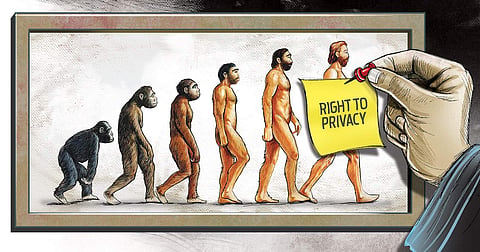

The 24th of August 2017 is a red letter day in the history of Indian legal jurisprudence. For the first time in independent India, a nine-judge Bench of the Supreme Court has delivered an overarching and historic landmark decision on the right to privacy.
This unanimous judgment concludes that you as a person have a fundamental right to privacy, enshrined under the right to life, as a fundamental right under Article 21 of the Constitution of India. This is an intrinsic element of Part III of the Constitution, and is thus entitled to basic protection guaranteed to these rights. With this judgment, the SC has upheld not just the sanctity of personal as well as data privacy, but also clarified the legal position once and for all by overruling some earlier—at times contradictory—judgments on privacy by other courts. The net effect is very simple: As a citizen of India today, I have a fundamental right to privacy.
Here it is important to make a distinction between fundamental and absolute rights. The right to privacy has been declared a fundamental right as guaranteed by the Constitution, which effectively means that if any state action violates this right on any ground whatsoever, arbitrary or otherwise, you as a citizen can challenge it in the writ jurisdiction either to the High Court under Article 226 of the Constitution or before the SC under Article 32 of the Constitution.
Prior to this judgment, Indians never seemed to be really confident about their privacy being adequately protected by the law. Historically speaking, as a nation, we come from a society that originated from the joint family system. Consequently, sharing of information and intrusions on our privacy was always a default option.
This judgment is important because India has never had a dedicated law on privacy. Indian lawmakers have traditionally refrained from such legislation. Some work was done on draft privacy legislation by the Department of Personnel & Training a few years ago, but the draft Privacy Bill went nowhere. Even the Indian cyberlaw, or the Information Technology Act, 2000, failed to provide any adequate legal provisions to protect and preserve privacy.
In the context of the rapidly growing and almost omniscient digital and mobile ecosystem, privacy is already an evaporating concept. State and non-state actors are continuing to invade upon the privacy of digital users and netizens—which is why the present judgment comes in as breath of fresh air. By upholding the right to privacy as fundamental right under the Constitution, the SC as the guardian of the Constitution, has given a loud and clear message not just to Indians, but to the entire world, that the pure stream of ideals, for which the Constitution stands, will continue to permeate every area of human endeavour, and that no state action will be allowed to impede or violate those constitutional provisions.
Contrary to some prevailing conceptions, this ruling does not overrule Section 377 IPC on homosexuality. This ruling is going to have a massive impact on Aadhaar. Being a state project, Aadhaar would now have to be examined from the perspective as to whether its existing features infringe on people’s fundamental right to privacy. This becomes all the more important given the fact that the Aadhaar (Targeted Delivery of Financial and Other Subsidies, Benefits and Services) Act, 2016 has not comprehensively dealt with aspects governing privacy in the Aadhaar ecosystem.
It was initially introduced as voluntary and so, the law only talks about certain aspects of protection of Central Identities Data Repository. Thereafter, the government started making it mandatory. A new ecosystem of Aadhaar has developed which does not have adequate protection of either privacy or cybersecurity.
With protection of privacy having an intrinsic connection with cybersecurity, far more focus on it is required. The higher the level of cybersecurity, the brighter the chances that the privacy of relevant stakeholders would not be breached by unauthorised state and non-state actors. This judgment has cited various instances of how the privacy of users could be potentially breached in today’s context.
Seen from another perspective, the present judgment has effectively provided an emphatic negative answer to the government’s stand that people do not have a right to privacy on their own body or personal data. While intrinsically recognising privacy as a superior fundamental right, the apex court has categorically held that a person can be deprived of the enjoyment of such rights provided it is in accordance with the procedure established by law. Thus, if any legal framework provides for depriving the privacy of citizens, the same is permissible under law so long as the said procedure established by law is free, fair and reasonable and is proportionate to the outcome sought to be achieved.
It is going to take a couple of weeks before the various nuances of the impact of the judgment can be effectively analysed. There are lot of invaluable lessons in the judgment. It will continue to be a beacon that guides all future interpretations on how the issue of privacy has to be addressed as a fundamental right in the coming times.
Of further relevance is the fact that the judgment is extremely progressive and futuristic: It recognises that technology is changing very rapidly and new interpretation of privacy would be required with the passage of time. Given the expectation of every citizen who wants to studiously protect his/her private space, the present judgment comes as a big celebration of privacy which uplifts the spirit and encourages the enjoyment of human life with dignity, respect and tranquility.
Pavan Duggal
Advocate, Supreme Court of India
Email: pavan@pavanduggal.com